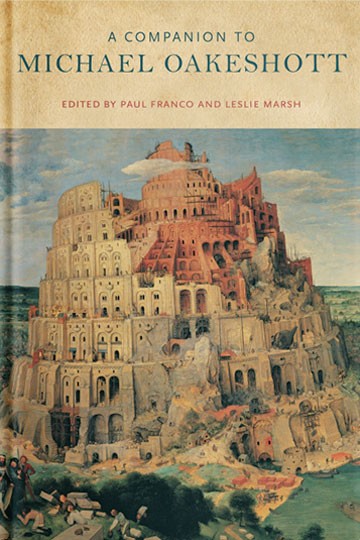
- Publisher: Penn State University Press
- Available in: Hardcover, Paperback
- ISBN: 978-0-271-05407-0
- Published: August 10, 2012
Edited with Leslie Marsh
Michael Oakeshott has long been recognized as one of the most important political philosophers of the twentieth century, but until now no single volume has been able to examine all the facets of his wide-ranging philosophy with sufficient depth, expertise, and authority. The essays collected here cover all aspects of Oakeshott’s thought, from his theory of knowledge and philosophies of history, religion, art, and education to his reflections on morality, politics, and law.
Aside from the editors, the contributors are Corey Abel, David Boucher, Elizabeth Corey, Robert Devigne, Timothy Fuller, Steven Gerencser, Robert Grant, Noel Malcolm, Kenneth McIntyre, Kenneth Minogue, Noël O’Sullivan, Geoffrey Thomas, and Martyn Thompson.
Reviews
“This timely collection brings together an important set of essays exploring various aspects of the philosophy of Michael Oakeshott. For those unacquainted with Oakeshott’s brilliant but sometimes enigmatic writings on civil association, history, the nature of human experience, education, and political authority, this volume stands as a tribute to his growing intellectual stature in the twenty-first century. It shows just how far Oakeshott studies in the Anglophone world have come in the past two decades, and it lays out a path for where they might productively go in the future.” —Richard Boyd, Georgetown University
“Michael Oakeshott remains one of the great political philosophers of the twentieth century. Yet his writings—at least in America—rarely get the time or attention they deserve. This wonderful anthology beautifully covers virtually every aspect of Oakeshott’s life and thought. It helps us appreciate Oakeshott’s own voice in the conversation of mankind.” —Steven Smith, Yale University
“Paul Franco and Leslie Marsh have put together a companion that does something that few companions actually do: it provides a serious introduction to the man and to the full range of his thought. The book does a nice job of locating Oakeshott in relation to other thinkers and of bringing out Oakeshott’s distinctive intellectual style. This is a book anyone who is starting in on Oakeshott can greatly benefit from, and which anyone who knows Oakeshott will enjoy.” —Stephen Turner, University of South Florida